
Passiflora, known also as the passion flowers or passion vines, is a genus of about 550 species of flowering plants, the type genus of the family Passifloraceae.
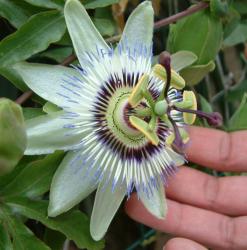
The Passifloraceae are a family of flowering plants, containing about 750 species classified in around 27 genera.
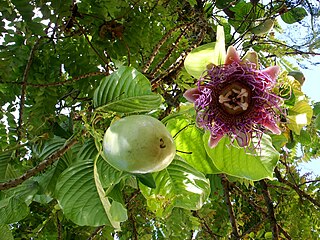
Passiflora quadrangularis, the giant granadilla, barbadine (Trinidad), grenadine (Haiti), giant tumbo or badea, is a species of plant in the family Passifloraceae. It produces the largest fruit of any species within the genus Passiflora. It is a perennial climber native to the Neotropics.

Passiflora incarnata, commonly known as maypop, purple passionflower, true passionflower, wild apricot, and wild passion vine, is a fast-growing perennial vine with climbing or trailing stems. A member of the passionflower genus Passiflora, the maypop has large, intricate flowers with prominent styles and stamens. One of the hardiest species of passionflower, it is both found as a wildflower in the southern United States and in cultivation for its fruit and striking bluish purple blooms.
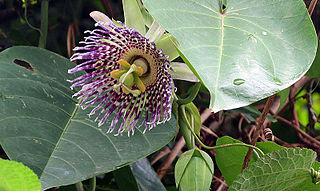
Passiflora ligularis, commonly known as the sweet granadilla or grenadia, is a plant species in the genus Passiflora. It is known as granadilla in Bolivia, Colombia, Nicaragua, Costa Rica, Ecuador, Mexico, The Azores, South Africa, and Peru, granadilla común in Guatemala, granadilla de China or parcha dulce in Venezuela, and granaditta in Jamaica.

Gunnera manicata, known as Brazilian giant-rhubarb or giant rhubarb, is a species of flowering plant in the family Gunneraceae from the coastal Serra do Mar Mountains of Santa Catarina, Parana and Rio Grande do Sul States, Brazil. In cultivation, the name G. manicata has regularly been wrongly applied to the hybrid with G. tinctoria, G. × cryptica.

Arctostaphylos otayensis is a species of manzanita known by the common name Otay manzanita. This shrub is endemic to California, where it is native to the mountains of San Diego County.

Passiflora tripartita also called curuba, tumbo, curuba de Castilla and tumbo serrano is a species of Passiflora from Peru, Bolivia, Ecuador, Colombia, and Brazil in areas at elevations of 2000 – 3200 meters.

Scea superba is a moth of the family Notodontidae first described by Herbert Druce in 1890. It is found in South America, including Ecuador.
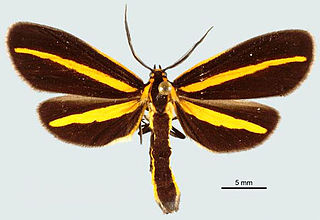
Josia radians is a moth of the family Notodontidae. It is found in Amazonian Colombia and Ecuador.

Acraea horta or the garden acraea is a butterfly of the family Nymphalidae. It is found in South Africa and Zimbabwe.

Passiflora loefgrenii, the garlic passion fruit, is a passion flower first formally described in 1997 by Fabio Augusto Vitta. The plant is named after Albert Löfgren, the first known collector.
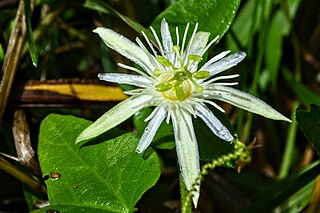
Passiflora capsularis is a member of the family Passifloraceae with vanilla scented, delicate white flowers around 5 centimetres (2.0 in) long. It produces unusual looking ribbed ellipsoid fruits reddish purple in color, which are not edible. It grows readily in tropical climates, tolerating down to 5 °C and even lower for short spells. It flowers and grows readily even in small pots.

Passiflora guatemalensis, the Guatemala passion vine, is a species in the family Passifloraceae. It is native to Guatemala, and found from southern Mexico through Central America to Venezuela.

Passiflora coccinea is a fast-growing vine. The vine is native to northern South America. It produces edible fruit.
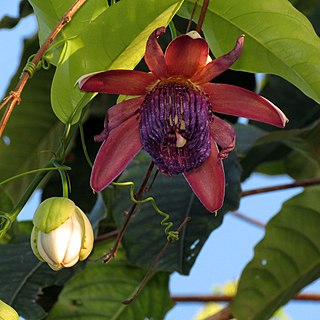
Passiflora ambigua is a species of flowering plant in the family Passifloraceae . It is found in Mexico, Belize, Costa Rica, and Colombia.

Passiflora cincinnata is a species of Passiflora from Brazil.

Passiflora membranacea is a species of Passiflora from Costa Rica, Guatemala, and El Salvador.
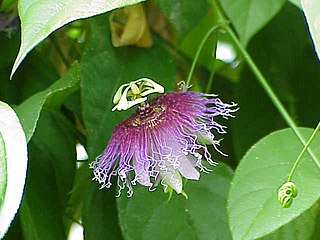
Passiflora serratifolia is a species of Passiflora from Suriname.



















